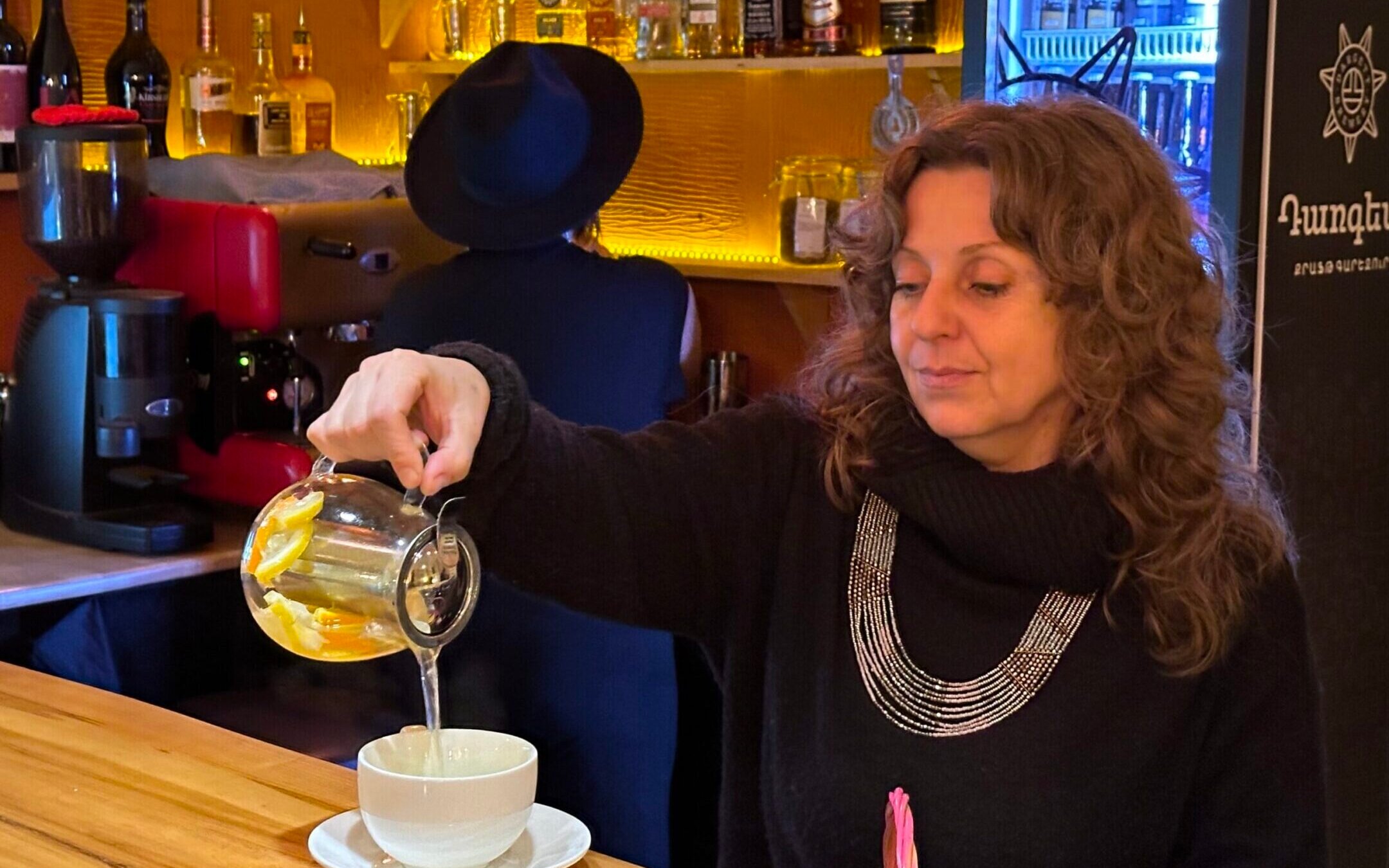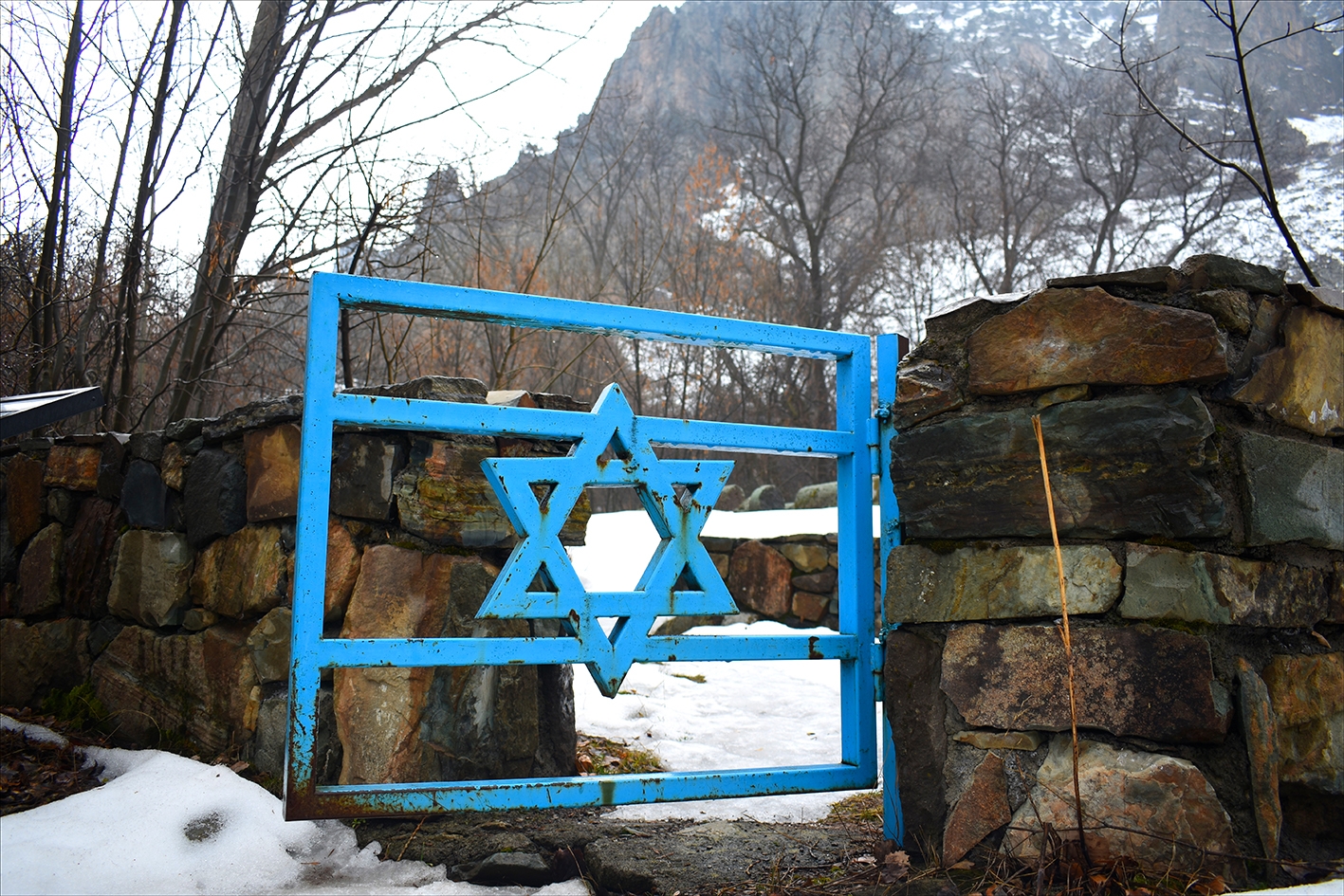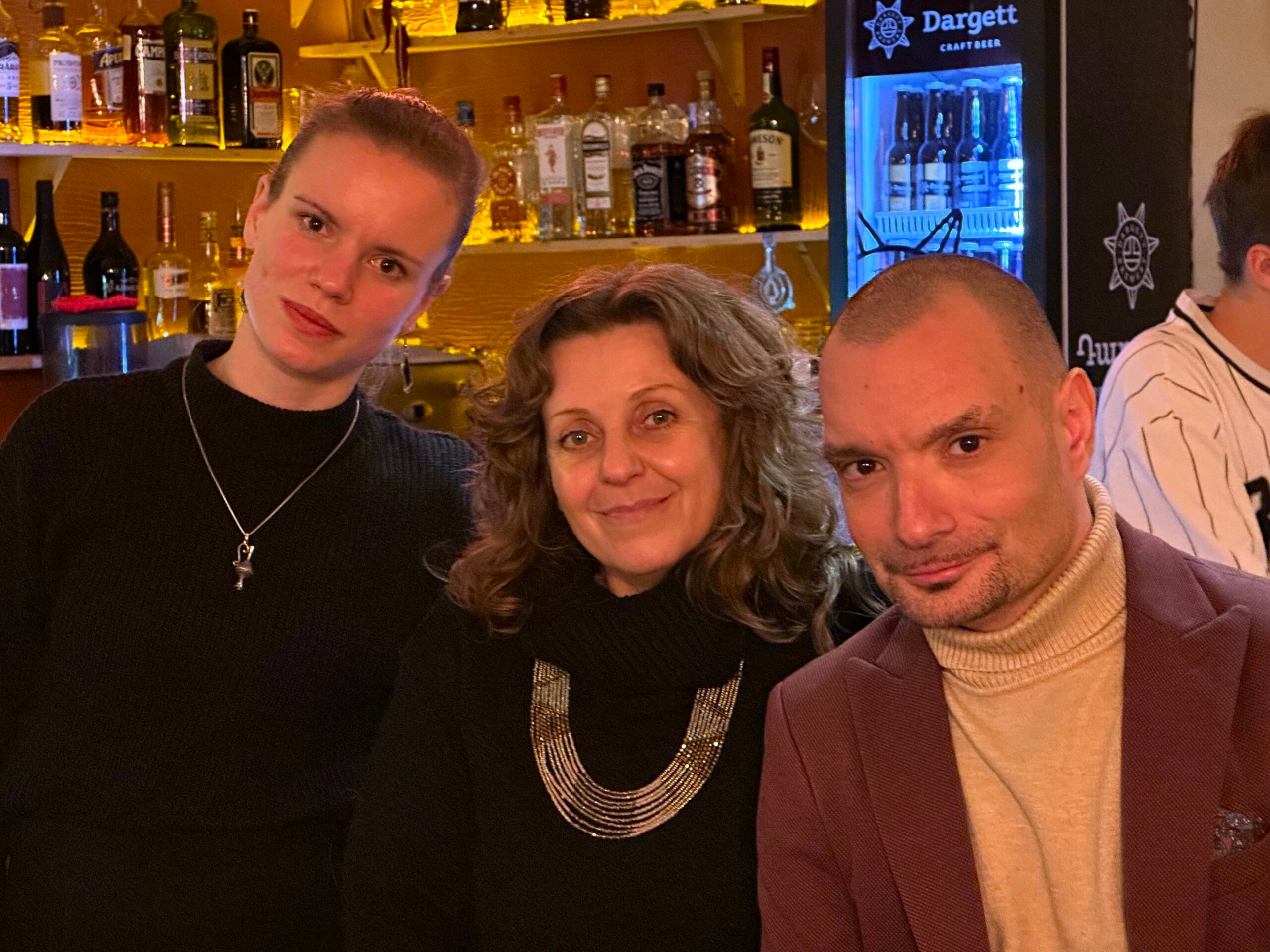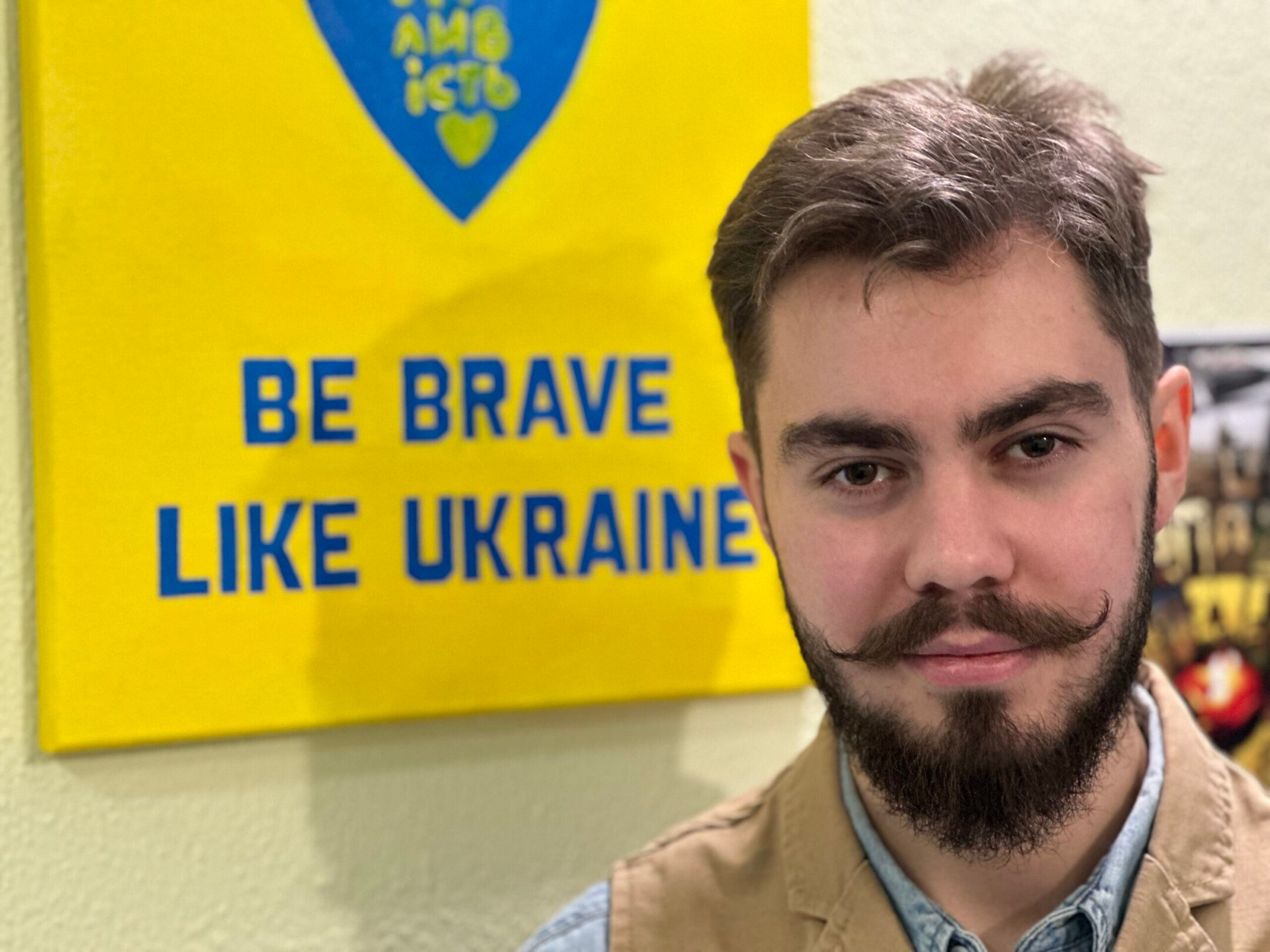Russia’s invasion of Ukraine inadvertently sparks a Jewish renaissance — in Armenia
Jews from both Ukraine and Russia made their way to Yerevan, Armenia’s biggest city. Many are staying

Julia Kislev, a Crimean Jew who’s been living in Armenia since 2016, pours a cup of tea at Mama Jan, the café she owns in Yerevan. Mama Jan has become the unofficial gathering place for Russian Jews who have settled here since Russia invaded Ukraine two years ago. (Larry Luxner)
YEREVAN, Armenia (JTA) — It’s just after sunset on a chilly February evening as Mama Jan begins filling up with customers. The cozy little café, located on Alexander Speniaryan Street — one block from Yerevan’s Freedom Square — lures passersby with its traditional khashlama (Armenian meat stew), dolma (stuffed grape leaves) and grappa (homemade brandy).
Inside, Edith Piaf melodies play softly in the background, while a blackboard near the bar lists the upcoming week’s activities: Saturday, a meeting of the English-speaking club; Sunday, a lecture on feminism; Wednesday, a screening of the movie “Golda,” and on Friday, Kabbalat Shabbat featuring baked challah and pomegranate wine.
Overseeing it all is Julia Kislev, a vivacious Crimean Jew who immigrated to Israel in 1992, settled in South Tel Aviv and learned fluent Hebrew. In 2016, Kislev joined her Armenian actor husband in Yerevan, and four years later, she opened Mama Jan — which has since become the unofficial gathering place of Armenia’s newest Jews, those displaced by the two-year-old Russia-Ukraine war.
“They find their shelter here,” said Kislev, 55, an Israeli citizen with local residency status.

A calendar at Mama Jan Café, fronting Alexander Speniaryan Street in Yerevan, which has become the unofficial gathering place for Russian Jews who have settled in Armenia since Russia invaded Ukraine two years ago. (Larry Luxner)
In the two years since Russia invaded Ukraine on Feb. 24, 2022, this landlocked former Soviet republic in the Caucasus has seen a surprise influx of Jews — mostly liberal young Russians opposed to the war, but also Ukrainians seeking safe haven. Together, their arrival has boosted Armenia’s total Jewish population tenfold, from fewer than a hundred to well over 1,000 today.
That’s a big deal for an ancient land that never had many Jews to begin with, even though Armenia — the world’s first Christian nation — boasts a medieval Jewish cemetery with 64 tombstones in Hebrew and Aramaic dating back to the year 1266.
Armenia became a Soviet republic in 1920, and following World War II, Jews relocated here from Ukraine, Belarus, Moldova and Azerbaijan. But after the USSR itself collapsed in 1991, nearly the entire Jewish community of 15,000 families emigrated en masse to Israel, leaving only a handful of aging congregants to keep the dwindling community from disappearing altogether.

Entrance to the ancient Jewish cemetery in Yeghegis, Armenia, which contains nearly 40 medieval tombstones from the 13th and 14th centuries C.E. inscribed in Hebrew and Aramaic. (Larry Luxner)
“If it weren’t for the war between Russia and Ukraine, there’d be maybe 50 or 100 Jews left here,” said Rabbi Gershon Meir Burshtein, spiritual leader at the Mordechay Navi Jewish Religious Center of Armenia. “We were thinking this would be the end. But then this influx of Jews came from Russia, mainly young people thirsting for Yiddishkeit.”
According to community organizer Nataniel Trubkin, some 120,000 Russian citizens fled to this Maryland-sized land of 3 million in the weeks and months following President Vladimir Putin’s unprovoked attack on Ukraine.
Some feared the draft; others were worried about sanctions and freezing of bank accounts. Their arrival contributed to a local construction boom that helped boost Armenia’s GDP by 12% in 2022 and a further 8% last year. Yet many Russians have since gone on to third countries or returned home.
Of the Russian Jews who remain, said Trubkin, about 60% are Muscovites like himself; the rest hail mainly from St. Petersburg, Novosibirsk, Yekaterinburg and Nizhny Novgorod.
“There may actually be more than 1,000 Russians with Jewish blood here, but for various reasons they have not shared their identity,” said Trubkin, who does copywriting and social media marketing for various Jewish organizations. “It’s interesting that most of these people are from the same social class — sometimes even from the same neighborhoods of Moscow.”
Likewise, of the 5,000 or so Ukrainian refugees who remain in Armenia, about 1,500 are Jews.

From left: Tatiana Kliuchnikova, Julia Kislev and Nataniel Trubkin at Yerevan’s Mama Jan Café. Kliuchnikova and Trubkin are among an estimated 1,000 Russian Jews who have settled in Armenia since Russia invaded Ukraine two years ago. (Larry Luxner)
Trubkin, 43, is among the regular patrons at Mama Jan, which under Kislev’s supervision hosts gatherings for every major Jewish holiday including Hanukkah and Purim. Burshtein, who bears a striking resemblance to Tevye the Dairyman, comes to the café often to conduct prayers, and some of the recent Russian arrivals have begun attending Shabbat services at his synagogue — the only one in Armenia.
One reason Armenia is so attractive to these newcomers — Jewish or not — is its lack of visa restrictions. It’s also easy to get flights to Yerevan from Russia, where air travel is limited because of sanctions imposed after the war’s start. Plus, the new Russian arrivals say, the locals are warm and welcoming, both to Russians and to Jews.
That’s a sharp contrast to neighboring Georgia, 20% of which remains under Russian military occupation following the Kremlin’s 2008 invasion. Anti-Russian graffiti can be seen throughout Tbilisi, where Russian immigrants, regardless of their political beliefs, are widely resented.
And despite Armenia’s unhappiness with Israeli weapons sales to archenemy Azerbaijan, as well as Israel’s refusal to officially recognize the 1915 Ottoman genocide of more than 1 million ethnic Armenians, the new arrivals say they have been pleasantly surprised not to have encountered the kind of violent antisemitism that has existed in Russia for centuries.
“In the media, Azerbaijan has been trying really hard to paint Armenia as an antisemitic, intolerant country. I work in the media here and know full well how it works,” Trubkin said, referring to regular warnings issued by the government of Azerbaijan that Armenia is rife with Nazism.
“We have a lot of experience fighting antisemitism,” he said. “We haven’t seen any here.”
It was after a particularly vicious attack by local neo-Nazis at a Moscow subway station that St. Petersburg native Anton Ronis, 22, decided to give up his spot studying economics at a prestigious academy and leave for Armenia.

Anton Ronis is a Russian Jew and anti-Putin activist from St. Petersburg who now lives in Armenia and volunteers for the Ukrainian nonprofit organization Dopomoga in Yerevan. (Larry Luxner)
The black eye the young Jew received cemented feelings that he had experienced since the beginning of the war.
“When the war [against Ukraine] started, I began talking to my friends at school, but it was like talking to a wall,” said Ronis, who protested against the Putin regime. “I realized that I could not influence the situation. I wanted to be useful, and I understood that in Yerevan, I could do more than in Russia. Those who support this war are people with very scary ideas, and they consider me their ideological enemy.”
For the past year, Ronis has been volunteering for the past year at Dopomoga—an Armenian charity that offers Ukrainian newcomers humanitarian assistance and language classes.
Yan Schenkman, an independent journalist, fled to Armenia from Russia in March 2022, just weeks after the war began.
“There was no reason for me to stay in Moscow. It was very dangerous for me,” said the 51-year-old, who wrote about artists, musicians and other dissidents for a variety of Russian-language print and online media before his departure. He had also visited Israel but didn’t feel comfortable there because, he said, “the Israelis are very aggressive.”
Since his arrival in Yerevan, Schenkman said he only occasionally hears antisemitic comments.
“Armenians know that Israel supports Azerbaijan with arms sales. But they also understand that Russians who come here have nothing in common with Putin, in the same way they distinguish between the Israeli government and ordinary Jews,” he said. “Every country has crazy, resentful people who push propaganda. Fortunately, in Armenia, there are not many of them.”
Tatiana Kliuchnikova, 28, arrived in Armenia on March 3, 2022 — exactly one week after the war began — with her 30-year-old husband Mikhail, who had previous army experience.
“We realized he’d be among the first to be drafted if it came to mobilization, so we came here,” said Kliuchnikova, who gives English and French lessons and also works as a translator. “We also went to Israel for two weeks to see what it feels like, but we don’t know the language and it’s difficult to integrate. Here, we feel accepted.”
Kliuchnikova added that in Armenia, Russian is widely spoken, and it’s easy to make a living.
“If you had asked me six years ago, I wouldn’t have thought of leaving Russia,” she said. “But for now, we want to stay in Armenia. We don’t want to go anywhere else.”
This article originally appeared on JTA.org.
















